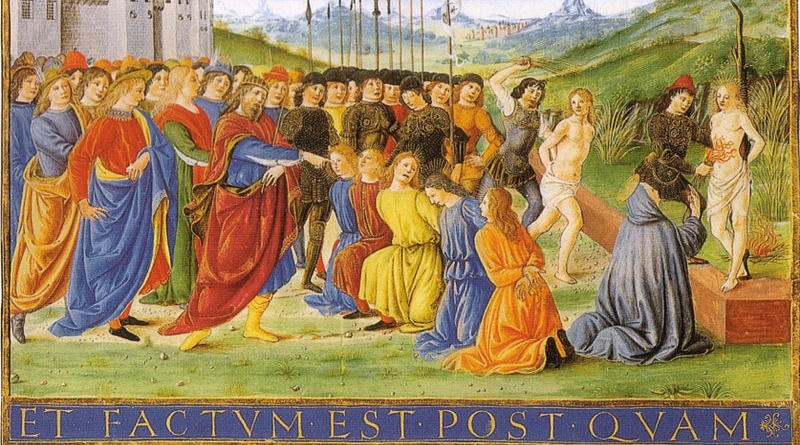Second Maccabees provides a striking account of the martyrdom of a Jewish mother and her seven sons under the rule of the Seleucid king, Antiochus IV. In those days (175–164 BC), Antiochus ruled over Judea, Syria, and other lands east of the Mediterranean Sea. Antiochus hoped that he could unify the quarreling peoples of the region by imposing Greek culture rooted in Greek religion on his empire. Yet faithful Jews refused to accept Greek ways, for they were incompatible with the Law of God. In 2 Maccabees 7, the Seleucids arrested a woman and her seven sons for rejecting the practices Antiochus sought to impose. If the family ate pork, a practice explicitly prohibited by the Law (see Lev 11:7–8 & Deut 14:8), they could go free. They refused. The king’s soldiers proceeded to torture each brother, but each brother, hoping that God would one day raise them from the dead for their fidelity, refused to break the divine laws given in Scripture. One by one, the oppressors killed them.
The most compelling martyrdom is that of the seventh brother. After detailing the deaths of the six older brothers, the author recounts: “Antiochus … thought he was being ridiculed. As the youngest brother was still alive, the king appealed to him, not with mere words, but with promises on oath, to make him rich and happy if he would abandon his ancestral customs: he would make him his Friend and entrust him with high office” (2 Macc 7:24). This marks a shift in tactics. Antiochus would not only threaten this rebel with torture; now he promised benefits as well. And these benefits were not paltry—the quoted translation capitalizes “Friend” because it was an official title. The shift also opens a window into Antiochus’s perspective.
Ambition marked Antiochus’s life. He had wrestled control of the Seleucid Empire from Heliodorus, an upstart chancellor who had assassinated Antiochus’s brother, King Seleucus IV. Yet neither Antiochus’s power nor his threats could overcome the will of the Maccabean martyrs. This perturbed him, so he tried the new strategy of generosity. He was willing to give hard-won wealth and power to a nobody. But that nobody refused the offer of wealth and power, the very things the king spent his life pursuing. And for what? To avoid eating a mouthful of pork. “The king became enraged and treated him even worse than the others, since he bitterly resented the boy’s contempt” (2 Macc 7:39).
The youngest son knew the goodness of the Law. It gave him a relationship to God. Following its statutes in their minutiae gave him means to honor God in the minutiae of his life. Conversely, to abandon the dietary code God gave under the covenant would amount to abandoning God. The youngest son cared for God over the goods that defined Antiochus’s life. Thus this powerless boy was a threat; his love for the Law condemned the whole of Antiochus’s lifestyle. If the boy was right in what he was doing, then Antiochus was a wicked waste of a man whose works amounted to nothing.
King Antiochus was presented with an occasion of grace that day. The family of martyrs showed him the possibility of a higher path; their witness suggested a new way of life, a way of piety and devotion and loyalty to the eternal God and Creator. But Antiochus had a hard heart. He took offense at the family who would rather die than break the Law of God. He was willing to give away money and honor to win the youngest over, but he was not willing to consider the possibility that he needed to change. So he killed the boy. Antiochus was not the last to make such an error, for martyrs are always offensive people. They contradict the world around them over matters that seem like trifles. In their love of God, they unveil the vanity of wealth and power. Those without faith, like King Antiochus, can only consider their devotion malicious. Yet those with faith know that the martyrs have chosen the better part. God deserves man’s love before all else, and that love is strong as death (Song 8:6).
✠
Image: Attavante, Martirio dei Sette Fratelli Ebrei







